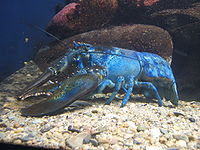- Mutant
-
For other uses, see Mutant (disambiguation).
 The blue lobster is an example of a mutant.
The blue lobster is an example of a mutant. Wild-type Physcomitrella and knockout-mosses: Deviating phenotypes induced in gene-disruption library transformants. Physcomitrella wild-type and transformed plants were grown on minimal Knop medium to induce differentiation and development of gametophores. For each plant, an overview (upper row, scale bar corresponds to 1 mm) and a close-up (bottom row, scale bar equals 0.5 mm) is shown. A, Haploid wild-type moss plant completely covered with leafy gametophores and close-up of wild-type leaf. B-D, Different Mutants.[1]
Wild-type Physcomitrella and knockout-mosses: Deviating phenotypes induced in gene-disruption library transformants. Physcomitrella wild-type and transformed plants were grown on minimal Knop medium to induce differentiation and development of gametophores. For each plant, an overview (upper row, scale bar corresponds to 1 mm) and a close-up (bottom row, scale bar equals 0.5 mm) is shown. A, Haploid wild-type moss plant completely covered with leafy gametophores and close-up of wild-type leaf. B-D, Different Mutants.[1]
In biology and especially genetics, a mutant is an individual, organism, or new genetic character, arising or resulting from an instance of mutation, which is a base-pair sequence change within the DNA of a gene or chromosome of an organism resulting in the creation of a new character or trait not found in the wild type. The natural occurrence of genetic mutations is integral to the process of evolution. The study of mutants is an integral part of biology, by understanding the effect that a mutation in a gene has it is possible to establish the normal function of that gene.[2] In some organisms mutants can be created by gene targeting to assess the function of any given gene. This experimental approach is called reverse genetics[3]. For example, a collection of knockout moss mutants can be used to identify genes with so far unknown functions [4].
Etymology
Although not all mutations have a noticeable phenotypic effect, the common usage of the word mutant is generally a pejorative term only used for noticeable mutations.[5] The scientific usage is broader, referring to any organism differing from the wild type.
Mutants should not be confused with organisms born with developmental abnormalities, which are caused by errors during morphogenesis. In a developmental abnormality, the DNA of the organism is unchanged and the abnormality cannot be passed on to progeny. Conjoined twins are the result of developmental abnormalities.
Chemicals that cause developmental abnormalities are called teratogens; these may also cause mutations, but their effect on development is not related to mutations. Chemicals that induce mutations are called mutagens. Most mutagens are also considered to be carcinogens.
References
- ^ Egener et al. BMC Plant Biology 2002 2:6 doi:10.1186/1471-2229-2-6
- ^ http://www.pnas.org/content/68/9/2112.abstract Clock Mutants of Drosophila melanogaster
- ^ Ralf Reski (1998): Physcomitrella and Arabidopsis: the David and Goliath of reverse genetics. Trends in Plant Science 3, 209-210 doi:10.1016/S1360-1385(98)01257-6
- ^ Egener et al. BMC Plant Biology 2002 2:6 doi:10.1186/1471-2229-2-6
- ^ Mutant. (n.d.). The American Heritage Dictionary of the English Language, Fourth Edition. Retrieved March 05, 2008, from Dictionary.com website: http://dictionary.reference.com/browse/mutant
External links
Categories:
Wikimedia Foundation. 2010.

